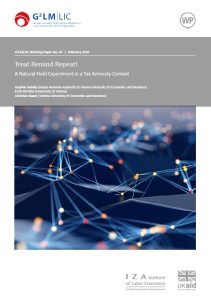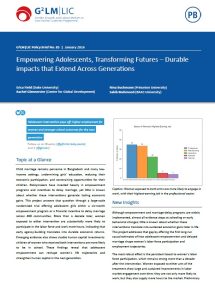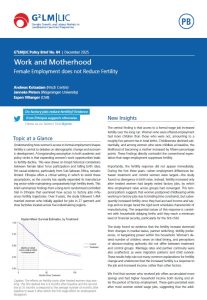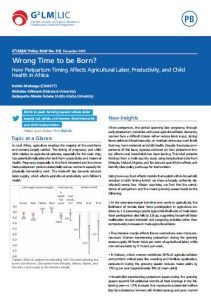Our newest publications
Treat Remind Repeat!
A Natural Field Experiment in a Tax Amnesty Context
By Gayline Vuluku, Erich Kirchler, and Christian Bauer
This study evaluates the impact of behavioural interventions on the uptake and payment of tax arrears through an amnesty program in Kenya. Using a randomised controlled trial, 43,666 tax delinquents from Nairobi region were evaluated. Taxpayers were assigned to receive either a neutral informational email, one of three behavioural messages on deterrence, social norms,...
Empowering Adolescents, Transforming Futures
Durable Impacts that Extend Across Generations
By Erica Field, Rachel Glennerster, Nina Caroline Buchmann, and Sakib Mahmood
Child marriage remains pervasive in Bangladesh and many low-income settings, undermining girls’ education, reducing their economic participation, and constraining opportunities for their children. Policymakers have invested heavily in empowerment programs and incentives to delay marriage, yet little is known about whether these interventions generate lasting economic gains. This project answers that question through a...
Work and Motherhood
Female Employment does not Reduce Fertility
By Andreas Kotsadam, Janneke Pieters, and Espen Villanger
Understanding how women’s access to formal employment shapes fertility is central to debates on demographic change and economic development. A longstanding assumption in both academic and policy circles is that expanding women’s work opportunities leads to fertility decline. This view draws on broad historical correlations between female labor force participation and falling birth rates....
Wrong Time to be Born? How Peripartum Timing Affects Agricultural Labor, Productivity, and Child Health in Africa
By Kelvin Mulungu, Nicholas Kilimani, and Gebeyehu Manie Fetene
In rural Africa, agriculture employs the majority of the workforce and remains largely rainfed. The timing of pregnancy and child-birth relative to agricultural calendar, especially for the main crop, has potential implications for both farm productivity and maternal health. Pregnancy (especially in the third trimester) and the immediate postpartum period substantially reduce women’s capacity...
Strengthening Childcare Markets through Social Franchising: Evidence from Kenya
By Emily Beam, Anne Fitzpatrick, and Maira Emy Reimão
High-quality daycare has the potential to be a “triple-win”: fostering child development, increasing parental income, and increasing daycare profits in a mostly female workforce. However, in many low- and middle-income countries, the daycare industry is largely unregulated. Quality is often low especially in poor communities—and raises child safety and health concerns. Low quality may...









